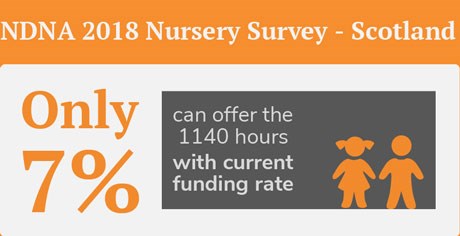Survey reveals falling confidence in 1,140 hour childcare scheme
Monday, June 11, 2018
Almost half of private nurseries in Scotland are unlikely to offer extended childcare, the NDNA annual survey suggests.

- Survey shows rise in number of nurseries unlikely to offer the 1,140 hour scheme from 2020
- Just 7 per cent of nurseries could offer the scheme on current funding rates
- Number of nurseries offering places for disadvantaged two-year-olds falls for the first time
The number of settings 'unlikely' or 'very unlikely' to offer the 1,140 hours of funded childcare scheme for three- and four-year-olds, has risen from 24 per cent last year to 46 per cent.
The percentage of settings that would get involved with the scheme, which comes in from 2020, has fallen since last year when 51 per cent said that they were 'likely/very likely' to take part, to just 30 per cent this year.
Findings from the NDNA 2018 Nursery Survey - Scotland show that funding is the biggest barrier to offering the extended hours. Just 7 per cent of respondents said that they could offer the full 1,140 hours on the funding rate they receive for the current system of 600 hours of early learning and childcare.
The 2018 survey findings are based on responses from 226 settings in Scotland. The 2017 survey figures were based on 221 responses.

For 79 per cent of nurseries, funding for the 600 hours for three- and four-year-olds does not cover their costs. Hourly shortfalls are the highest they have ever been, with nurseries experiencing an average yearly funding shortfall per child of £1,188. To offset this loss, over half the sector are planning to increase their fees.
Another issue raised by respondents is the Scottish government requirement for providers delivering the 1,140 hours to pay staff the Scottish Living Wage. There is an expectation that all staff in the setting will get this higher rate of pay. NDNA warns this has the potential to significantly impact nurseries’ business sustainability in the medium to long-term.
When asked what would enable them to offer the 1,140 hours, just over 80 per cent said a better funding rate. More than half said being able to make mandatory charges for ‘extras’, such as food, day trips etc., while 44 per cent said being allowed to set session times.
Two-year-olds
For the first time, the annual survey shows that the number of nurseries providing funded two-year-old places is in decline at 23 per cent, compared to 29 per cent in 2017. More than a third (37 per cent) said that they are unable to do so because their local authority is not commissioning more partner providers.
Similarly, the hourly rate received from the local authority to deliver two-year-old places does not cover costs for more than half of providers. The average hourly shortfall has risen from £1.14 to £1.33. NDNA says this is equivalent to an annual loss of £798 per child, per year for the 600 hours.
Furthermore, the hourly rate received from the local authority does not cover costs for more than half (62 per cent) of providers. While the funding received has increased from £4.54 in 2017 to £4.66 per hour in 2018, the average hourly shortfall has risen from £1.14 to £1.33. This is equivalent to an annual loss of £798 per child, per year for the 600 hours annual funded entitlement.
Launching the findings today in Glasgow, NDNA’s chief executive Purnima Tanuku said, ‘NDNA has uncovered the true predicament that nurseries in Scotland find themselves in and it has reached a crisis point.
‘Private nurseries just don’t feel confident that sufficient funding will be passed onto providers by local authorities to make it worthwhile for them to deliver the full 1,140 hours provision. This would drastically reduce childcare choices for parents.
‘These figures make grim reading, with the average nursery having to absorb £1,188 for each child during the course of a year. Many are small businesses which just can’t continue with this level of debt.
‘As the Scottish government via local authorities is their biggest customer, it needs to guarantee it can pay a fair rate which would enable all providers to continue as sustainable businesses.
‘We need action now with an urgent injection of cash to improve current funding rates, otherwise many nurseries will not even be open by 2020.
‘The requirement for providers to pay staff the real Living Wage, which is over and above the legal minimum, is too much for nurseries to commit to without knowing how much they will be given per child. Nurseries as responsible employers support paying proper wages for quality work but to do this, they need adequate funding from government to deliver the policy otherwise they cannot make ends meet.'
Other challenges
According to the survey findings, the biggest challenges for nurseries in 2018 are:
- Rising staff wages
- Recruitment and retention of staff
- Being able to make a profit or surplus
Losing staff to local authority nurseries or schools is an increasing problem, with respondents reporting this as their fourth most significant concern in 2018. The average loss of staff per nursery has increased from 2.6 in 2017 to 3 staff members this year.
The survey also found that despite recent Scottish government initiatives on graduate recruitment to the sector, the average nursery employs just two graduates, with almost a fifth not employing any.
More nurseries also reported that they expected to make a loss this year, with 16 per cent of settings predicting losses, compared to 12 per cent in 2017. Fewer nurseries this year also expect to make a profit or surplus.
Recommendations
To address the sector’s concerns and protect high-quality, sustainable childcare provision, NDNA is calling on the Scottish government to:
- Increase funding rates now for the 600 hours
- Increasing funding for the 1,140 hours in line with projected costs
- Increase investment in the sector to support the training and development of nursery staff
- Bring in a Childcare Passport, bringing together all childcare funding schemes
A Scottish Government spokesperson said, 'Since this survey was carried out, the Scottish Government has agreed a landmark near £1 billion funding package with COSLA which provides for local authorities to offer fair and sustainable funding rates to private and third sector nurseries, which will significantly increase rates across Scotland and enable all childcare workers delivering the funded entitlement to be paid the Scottish living wage.
'We recognise and value the key role that providers in the third and private sectors, including many NDNA members, have to play in the expansion of funded early learning and childcare. We are working hard with COSLA and local authorities to promote positive and effective partnerships with all childcare providers and relief from non-domestic rates, and the introduction of a "funding follows the child" model will provide private and third sector nurseries with more opportunities to offer their services as part of the expansion.'
Case Study
Mairi Maciver Clark, owner of Muberry Bush Montessori - two settings, one in Kilearn (Stirling) and the other in Yorkhill (Glasgow)
The nursery owner says it is unlikely she will be delivering the 1,140 hours unless funding is increased.
Ms Clark receives £4.50 per hour, per child from Stirling Council to deliver the 600 hours. Settings piloting phase one of the 1,140 hours in Stirling receive 5.45 per hour, per child. However, she says based on calculations by her accountant, she would need £6.98 per hour, per child. This rate does not include the cost of paying all staff the real Living Wage, just those working with children aged three and up, nor does it cover the costs of meals.
She told Nursery World it would be 'financial suicide' to offer the 1,140 hours on the current funding rate.
However, a funding rate for the national roll-out of the 1,140 hours has yet to be decided.
- Read the report here









